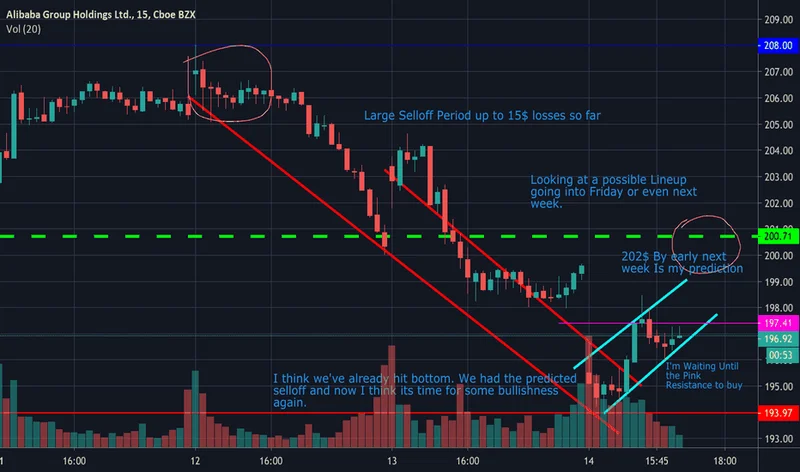Baba Stock: Price Slips, White House Memo, and What We Know
Alibaba (BABA) stock has been on a tear this year, fueled by—what else?—artificial intelligence. Up roughly 91% year-to-date, the narrative is that its AI cloud unit and fast delivery services are driving growth. The question, as always, is whether the numbers support the story, or if we're looking at another case of AI-fueled exuberance masking underlying weaknesses.
TipRanks’ AI Analyst Rina Curatex (powered by OpenAI-4o) recently downgraded the stock to Neutral, cutting the price target to $176. This is a notable contrast to the overwhelmingly bullish sentiment on Wall Street, where the average target price suggests a 24% upside. The AI analyst cites "bearish technical indicators and valuation concerns," despite acknowledging the YTD gains. This discrepancy is the first red flag. Are human analysts missing something that the algorithms are picking up? Or vice versa, is the AI analyst being overly cautious?
Digging Into the Data
Alibaba's Q1 FY26 results showed revenue reaching 247.7 billion yuan (that's $34.6 billion), with cloud sales climbing 26% year-over-year to 33.4 billion yuan. That’s solid growth, no question. The problem? Weak free cash flow, which the report attributes to high spending. High spending on what, exactly? The report isn't specific, which is always a bit concerning. It also mentions that the quick-commerce business is still losing money due to intense competition.
And this is the part of the report that I find genuinely puzzling. If AI and cloud services are supposedly driving growth, why are these other areas dragging down the overall performance? It suggests that Alibaba is relying on unsustainable levels of spending to maintain its position in these competitive markets.
One of the more interesting developments is Alibaba's move into robotics and "embodied intelligence," investing in a startup called Dexmal. While the details are scarce, the idea is to lock in AI talent and position itself at the forefront of robotics. It’s a smart move, potentially, but also a very expensive one. These types of long-term bets rarely pay off immediately, and they require significant capital investment.

The market seems to be wobbling on the AI front in general. Baidu's stock recently took a hit after its Ernie 5.0 AI model reveal underwhelmed investors. Investors are starting to differentiate between real earnings power and AI hype. Any perceived misstep or political headline can trigger sharp moves in the whole China tech complex — including BABA.
Adding fuel to the fire, a White House memo has surfaced, claiming that Alibaba is helping the Chinese military target the United States. Details are still vague, but the allegation is enough to spook investors and revive fears of US-China tech decoupling. This is a risk that's difficult to quantify, but it's definitely hanging over the stock. Alibaba dips after White House memo claims it's helping Chinese military target US: report (BABA:NYSE)
A Matter of Valuation
The core issue, as the AI analyst points out, comes down to valuation. Even with the recent pullback, BABA remains up significantly for the year. The P/E ratio is around 18-19x, which isn't outrageous, but it's not exactly cheap either. Given the geopolitical risks, the weak free cash flow, and the uncertain outlook for the Chinese consumer, it's hard to argue that the stock is undervalued.
Alibaba is also aggressively repurchasing its own shares. In the quarter ended September 30, 2025, the company repurchased 17 million ordinary shares for US$241 million. As of that date, it still had US$19.1 billion left under its board‑authorised share repurchase program. Share buybacks can boost per-share earnings, but they're also a sign that management doesn't see better uses for its cash.
The AI Analyst Got It Right
The market is pricing in a best-case scenario for Alibaba, assuming that its AI initiatives will pay off handsomely and that the Chinese economy will rebound strongly. The numbers, however, paint a more nuanced picture. While Alibaba is making progress in AI and cloud services, it's also facing significant challenges in other areas, and the geopolitical risks are very real. The AI analyst's downgrade is a dose of reality.
